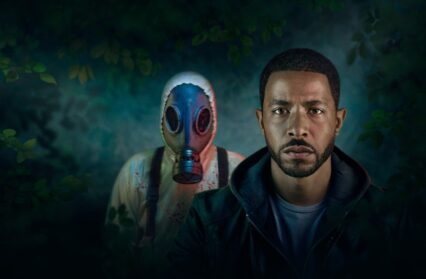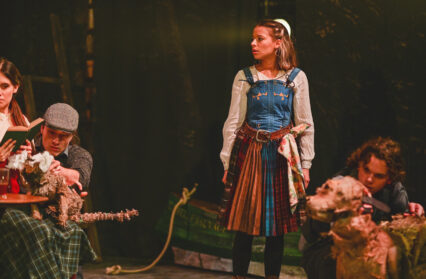Gary Raymond reviews the new BBC Thriller, Wolf, adapted from the international best-seller Mo Hayder detective novels featuring her creations DCI Jack Caffery.
The title of this new grizzly BBC thriller, Wolf, puts front and centre the fairy tale macabre that promises to serve the drama so well. Families – youngsters in particular – are in peril, hunted by whatever watches from the woods. Few here are who they pretend to be, and from the off viewers are made aware that nobody can be trusted, disguises will be shed, torn off, and innocence only really exists to be tarnished and despoiled. A shame then, that this television adaptation has so many tonal problems, so little heft, and only a passing interest in the Grimms Brothers shading that was begging to be drawn out.
Mo Hayder’s source material is dark – dark dark dark – and made all the more delicious by its sense of humour. The novels are huge best-sellers, Hayder’s swaggering prose a major part of their success. She is a bold writer who enjoys her work in that contagious way that encourages the gathering of armies of loyal fans. I wonder what they will make of this TV outing.
Ukweli Roach takes on the part of Hayder’s popular DCI Jack Caffery, a detective obsessed with the man he holds responsible for the murder of his 10-year-old brother who went missing twenty years before. Roach is moody and narky and very difficult to sympathise with, snapping at chatty old men, and pushing cherished family heirloom champagne flutes off the table with a teasing sneer as he argues with his girlfriend (who, in fairness, has just dropped a bit of a bombshell on him – it’s not that Caffery reacts angrily, it’s that his anger is so controlled and incisive and… well… discomforting). Despite all this, Roach is strangely lacking in anything resembling charisma – the vacuous moral centre of the fairy tale hurricane? Perhaps. But more likely the result of some flat writing and an actor having little room for manoeuvre.
Meanwhile, as Caffery deals with his past and an unhinged gf, the main plot emerges. A well-healed family retreat to their country pad in rural Monmouthshire so that the patriarch (Owen Teale) can be nursed back from heart surgery by his popped-collar wife (Juliet Stevenson) and his emotionally damaged twenty-two-year old daughter Lucia (Annes Elwy). Soon, in a well-paced opening episode, it becomes clear something is also resurrecting from their own past, and the family becomes isolated and terrorised within their own home. The main thrill of the early episode of Wolf lies in watching the two narratives come together, and seeing Caffery get closer and closer to the horrors in the house on the hill.
For reasons that one must assume have something to do with the terrifying allure of that home invasion plotline, the producers have decided to start new the end. Wolf is the seventh Hayder novel to feature Caffery as the investigator, and so adapting it as television’s introduction to him raises some character flaws that require too much work to unpick. There is too much to learn about Caffery, particularly given that it’s so hard to really care about him.
Megan Gallagher’s script has tried to transpose some of the dark comedy of Hayder’s novels, but if they ever had a chance of landing, the vision of the production doesn’t run with them. Some nice little moments, such as when the edit cuts from intestines hanging from a tree at a crime scene to the smoking goodies at a garden party barbecue, are left flat in the earnestness given to the characters around it. Caffery’s girlfriend early on tells Caffery that seeing as his brother was kidnapped and murdered twenty years ago it would probably be best if he just got over it. She says “I don’t mean to be insensitive…” as a disclaimer, but sounding insensitive, it turns out, is her best-case scenario. Later, maverick cop Sian Rees Williams cracks snide jokes from under her arched eyebrow while standing over the bodies of two mutilated teenagers. Frank Drebin, she is not. Iwan Rheon and Sacha Dawan have much more fun with their roles, but, then, they are supposed to be deranged.
Wolf has other problems.
What – for the love of all that is holy – is a Donkey Pitch? I asked around. For days I brought it up. Nobody had a clue. Google couldn’t help me either (although I would like to thank the creators of Wolf for inadvertently introducing me to this band). It is such a strange fabrication/obscurity to bombard your audience with for no good reason it felt almost interdimensional.
Donkey Witch is just one example of a drama wrestling with its own clutter. There is a lot to take in. A novel can guide the reader, envelope the reader, the layers beneath the prose can produce magic. But here, in TV land, there is too little time. There are too many monsters even before we realise “the Wolf” is metaphorical, and none of them are as unlikeable as Roach’s Caffery (that’s probably more than a tad unfair). The timelines flick back and fore, and although the time changes are dealt with well so the viewer shouldn’t ever be confused as to where we are, it does affect the momentum on more than once occasion. (You may also find yourself asking just how much you care about one story compared to another). But most of all, as stated above, Wolf isn’t funny. And it should have been funny.
All episode of Wolf are available on the BBC iPlayer.



 Enjoyed this article? Support our writers directly by buying them a coffee and clicking this link.
Enjoyed this article? Support our writers directly by buying them a coffee and clicking this link.






